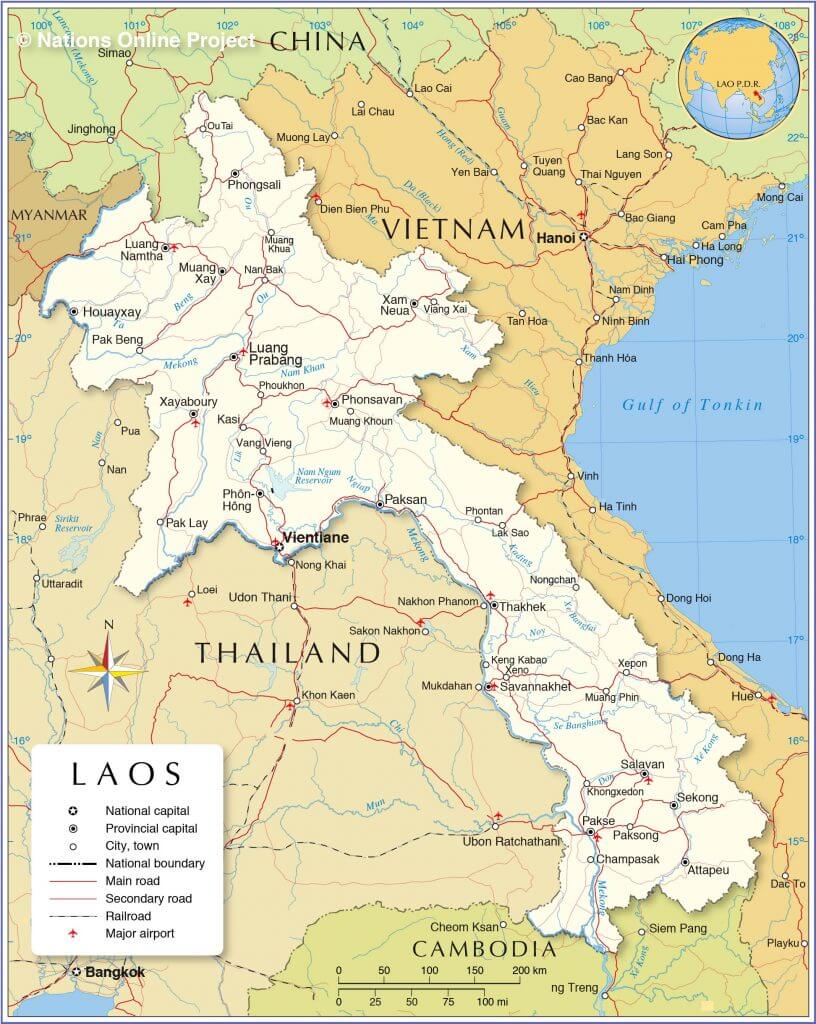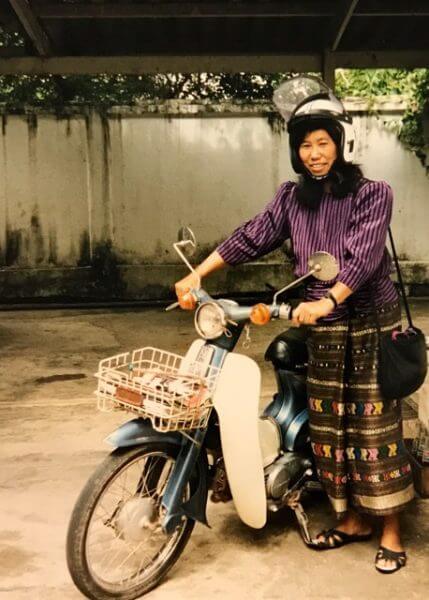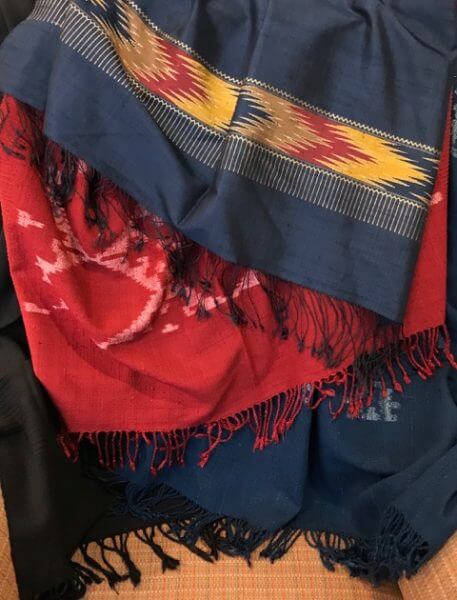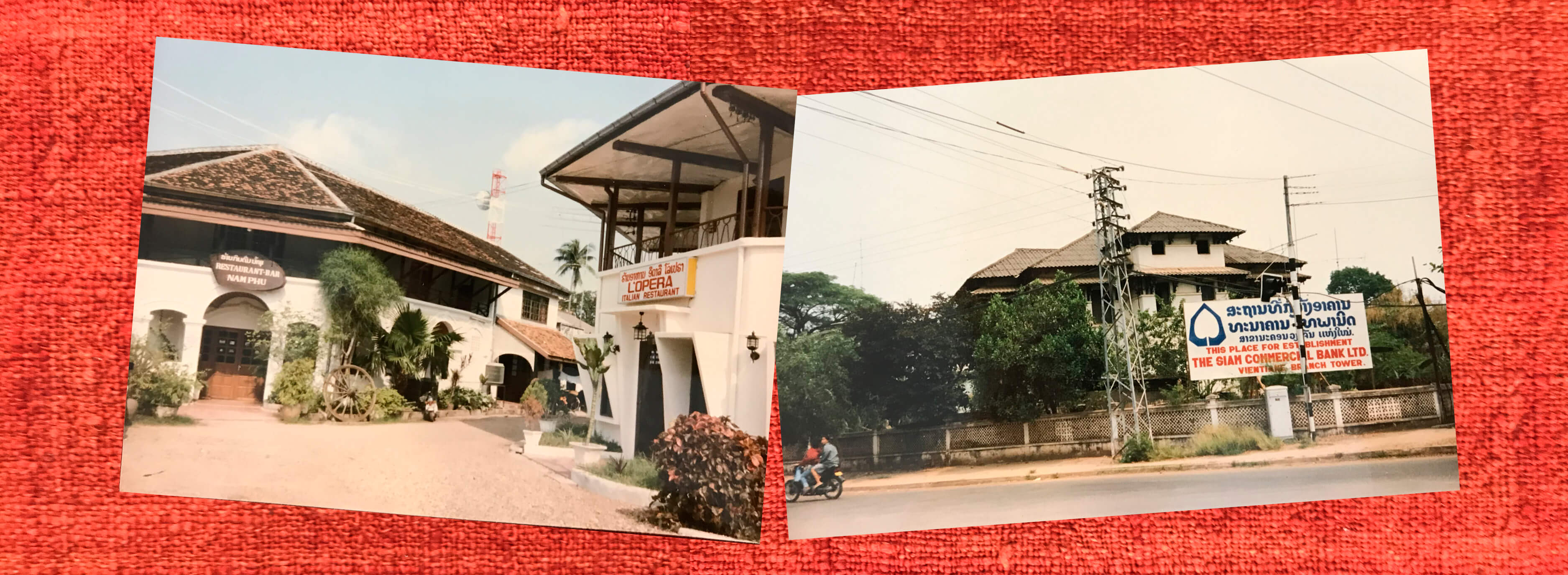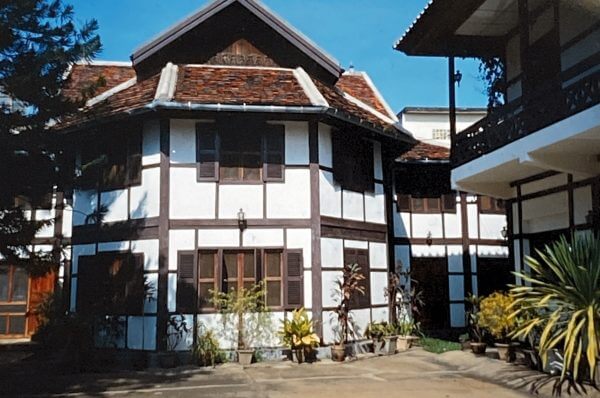#18: Laos 1991-1993 – Daily Life
Everyday life in Laos wasn’t as dramatic as an attempted coup or an assassination, but it was often challenging. Staying healthy, coping with high heat (over 100ºF) and humidity (99%) for much of the year, managing without household appliances that Americans take for granted, hosting frequent official events connected with Russell’s U.N. project, getting visas for overseas visitors — all these and more were character-building, to say the least. But they also left us with a sense of accomplishment, self-reliance and even triumph. Here’re a few examples from letters home.
1991
April 3
In Vientiane for a month now and thankful we’re having unseasonably cool weather (in the 70s). That it was unexpected makes it somehow more precious. No idea how long it will last. No local TV or newspaper. We’re like farmers in the old days, watching the skies and trying to forecast the weather.
Tomorrow is the second of three vaccinations for Japanese encephalitis. There’ve been some cases up-country, so we’re all getting the shots as a precaution. (A side note for the doctor in the family: the vector is mosquitos, and the intermediate host is pigs!)
April 24
Vientiane has several hospitals, one of them run by the Soviets, but none up to Western standards. Expatriates use either the Swedish or Australian Embassy Clinics, each staffed by a nurse-practitioner who dispenses inoculations, minor medications, etc. For serious problems, one flies 1.5 hours to Bangkok, the med-evac center for all of S.E. Asia.
May 29
I’ve been escorting the short-term project consultants to buy gifts for their home-folks — textiles, silver jewelry, pottery, brass, etc. One of them conceived a grand passion for our living room’s hand-loomed textile from N.E. Thailand. So yesterday we ferried across the Mekong, took a tuk-tuk for a 25-minute ride to a village outside Nong Khai, bought several meters of fabric and trekked back through a rainstorm that leaked around the tuk-tuk’s plastic side-curtains, obscured the other side of the river at the ferry, and royally drenched us as we went down and then up the landing steps.
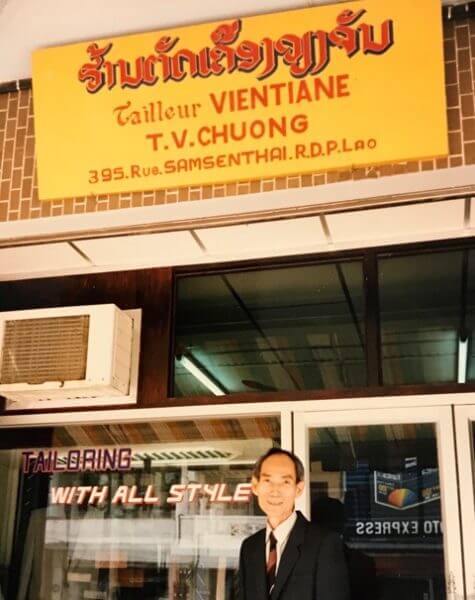 The few ready-made clothes here tend to be of poor quality and too small for us big guys. This week, we got our clothes back from the tailor, using fabric bought in Bangkok. They did a good job on Russell’s safari suit and bush jacket, but my skirt left something to be desired. When we get ready to come home and need winter clothes, we’ll have them tailored in Bangkok, where the workmanship is better.
The few ready-made clothes here tend to be of poor quality and too small for us big guys. This week, we got our clothes back from the tailor, using fabric bought in Bangkok. They did a good job on Russell’s safari suit and bush jacket, but my skirt left something to be desired. When we get ready to come home and need winter clothes, we’ll have them tailored in Bangkok, where the workmanship is better.
July 3
Disconcerting to be far from home and learn about the LA earthquake three days after it happened. We’ve sent a fax to [Russell’s brother there] and look forward to his reply.
We’ve both been suffering from fairly serious respiratory infections. Glad to have the Australian Clinic and its dispensary. I ended up in bed with three kinds of medicine. Now up and taking walks to build my strength.
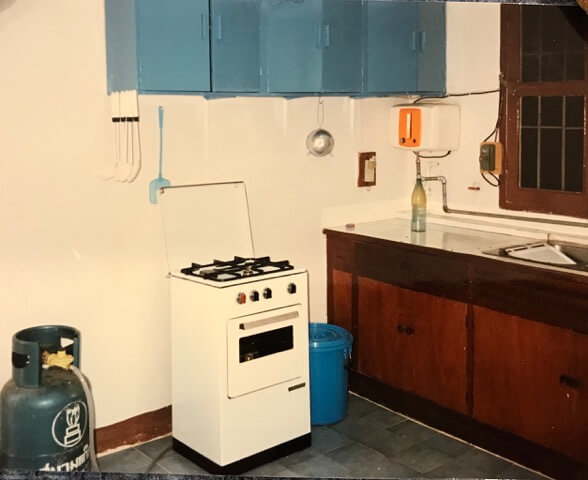 Russell’s hosting a reception to announce the publication of the first issue of Foreign Investment in the Lao PDR, a twice-yearly journal which he founded and edited. It’ll be distributed to all Lao embassies worldwide and to all foreign embassies here. Potential foreign investors are lining up to buy copies. R took main responsibility for this edition; his Lao colleague will have that role the next time, with R as backup.
Russell’s hosting a reception to announce the publication of the first issue of Foreign Investment in the Lao PDR, a twice-yearly journal which he founded and edited. It’ll be distributed to all Lao embassies worldwide and to all foreign embassies here. Potential foreign investors are lining up to buy copies. R took main responsibility for this edition; his Lao colleague will have that role the next time, with R as backup.
July 8
Entertaining with our stove takes some planning and ingenuity. It has three burners, but often we can use only two at once, because the stovetop is too small to allow three pots of any size. With Mme. Long’s help, we serve basically anything from several cuisines: Lao, Vietnamese, Chinese, Thai, Continental and American.
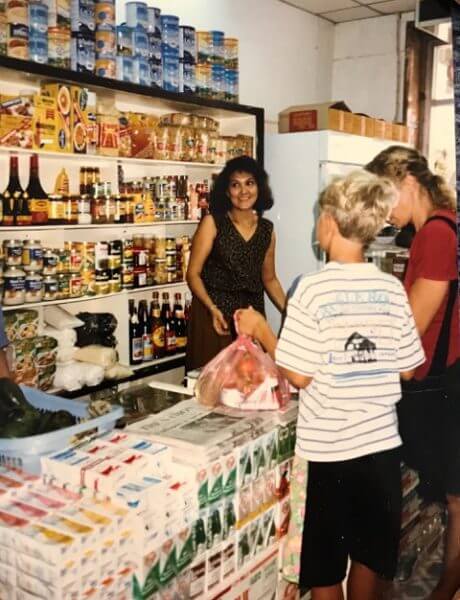 August 21
August 21
We can, on most days, get all of the following at the city’s only grocery store, really a mini-mart: a variety of European cheeses (no cheddar, though), fresh milk, whipping cream, yogurt (plain and flavored), butter (salted and unsalted). Tinned and powdered milk are always available, and we also have the milk which has been treated so it doesn’t need to be refrigerated until it’s opened. Good for cooking, but not so tasty on morning cereal. One rarely sees this in the States, but it’s been a God-send to the Third World with its relative lack of refrigeration. We substitute yogurt for buttermilk in cooking (e.g., pancakes), and it works fine. Fresh milk, whipping cream and yogurt come from dairies in Thailand, while the rest comes from Australia, New Zealand and various European countries.
The Mekong is very high, very swift and full of debris. Its headwaters are in one of the heaviest areas of flooding in southern China. Now’s also rainy season, with a particularly strong tropical storm this weekend. Rumors say the ferry to Thailand isn’t running, but we don’t know that for sure. They’ve built dirt levees to hold back the rising waters in at least two inlets in town. Army troops are making sandbags, and old timers are predicting a serious flood. Our house is about a block from the river, but it’s in an area where the bank is high, so it’s unlikely we’ll be bothered directly. We could be affected if roads are cut off, services shut down, etc.
August 29
Over a month ago, our hot water heater started leaking — just a minor drip, but still not a good thing. We informed our landlord and UNDP [United Nations Development Programme, the organization overseeing Russell’s project]. Two weeks ago, our landlord finally showed up with a used Soviet model. Normal practice is for the landlord to buy it, and UNDP to install it. It took two guys two days to remove the old one and install the new one.
The night of the installation, we had a flood at 11 p.m. Water started pouring from the bottom of the heater. I first turned off the electricity so we wouldn’t get electrocuted. Then I filled up a bunch of plastic tubs with water and traipsed through our garden in my nightgown to a far, dark corner and turned off the water at the main (there’s no valve in or near the house).
The next day the plumbers came, and the next…and the next…and the next. They kept having problems with disintegrating pipes, water pressure, taps breaking off and more. They finally finished a week after they started. Fortunately, we don’t have to pay the labor, but it’s sure been aggravating to stick around day after day with no water and wondering if my character would ever get built up to the point that I wouldn’t need this exercise in patience and flexibility.
Short-term team members are returning, and it’s Christmas! The Englishman brought a huge box of After-8 mints. I’m having to exert real discipline not to scarf them all in one afternoon. The American brought some clothes we’d ordered through catalogs and had delivered to his house. The Frenchman is next to arrive. Dare we hope for chèvre??
The joys of the monsoon: because there’s so much rain and it’s so humid, we can’t get the towels dry before they sour. We wash them by hand (either Mme Long or I), hang them out to dry on a covered porch or on the line in the back yard when there’s sun. Yesterday the sun came out at noon, so I rushed out, smelled all the towels on the porch (ick) and got down on my hands and knees to wash them in big plastic tubs. I hung them on the line, and they were doing ok. Then a tropical cloudburst appeared. They’re being washed again today.
September 18
This past weekend, we had a sit-down dinner for sixteen to bid goodbye to a departing short-term staffer and to welcome the long-term guy who just arrived. Guests were Lao and foreigners of several nationalities. It took Mme. Long, her sister and me working full time all day to pull it off. We were chopping and stirring and cooking and baking for hours, plus decorating, arranging flowers and setting tables. Menu: Lao version of tiny spring rolls, smoked oysters on crackers and shrimp-flavored chips to accompany drinks before dinner; then whiskey-pork, roasted chicken, mixed vegetables, baked eggplant and rice, followed by German chocolate cake and mixed tropical fruits with coffee and tea. We served buffet-style and let folks sit at either of two tables as they wished. We weren’t sure how many were coming, so we had to be more informal (i.e., no place cards as is the custom here for such affairs). Some folks stayed ’til 2 a.m.!
September 25
We’re hosting departing Australian friends for lunch today for a private goodbye. I just got through putting the cake in the oven and praying to the Oven God — we never know if it’ll work okay.
October 9
I went to Bangkok to help our British friend Hilary get her Lao visa and escort her to Vientiane. When we arrived at the airport for the morning flight to Vientiane, I was in the computer, but Hilary wasn’t, despite our previously reconfirmed reservations. I gave Hilary my seat because her tourist visa is very specific about the day and flight of her arrival. My resident visa is unrestricted.
Too late to get my bag off the plane, so the last I saw of Hilary, she had my baggage ticket and was being escorted to the plane by the Thai Air supervisor. We thought all would be well, because Russell would meet her, clear my bag and help her through Customs, etc.
[Laos had no cell phones at that time, and land lines from Bangkok to Vientiane were usually inoperable, so I couldn’t alert Russell to the changed plan.]
Later in Vientiane, Russell didn’t see his wife disembark with another woman, so he thought we hadn’t been able to get Hilary a visa. He checked the flight manifest, and when neither of our names was on it, he went home. Hilary talked one of the airport officials into letting her use the phone. When she reached Russell (by the grace of God: our phone has been on the fritz for weeks now), he returned to find her.
Meanwhile, I was trying to figure out how to get to Vientiane. No flight the next day, the overnight train full. So I talked to the Guest Relations ladies at the airport hotel. They kindly reserved a seat on a flight to Udon Thani that afternoon and a hotel reservation there for the night. Udon, as you may recall, is a Thai provincial capital about 50 km south of Nong Khai, where the ferry crosses the Mekong to Laos. The ladies gave me a discounted hotel day-room until the plane left at 5:30. After a late lunch, I shopped in the hotel’s mini-mall for toothbrush and toothpaste, undies, cotton trousers and a T-shirt.
I was a bit worried that the flight would be bumpy because it was so late in the day, when the monsoon can blow up storms. But the flight was smooth. I was met at the airport by the hotel van and in my room by 7 p.m.
The next morning, I asked the young lady at the hotel desk to help me hire a car and driver to take me to Nong Khai. She called several agencies, but all were booked. Finally she said, “Would you mind a pick-up car?”
“What’s that?” I asked.
After consultation with the voice on the other end of the line, she said, “A Nissan.”
I shrugged. “OK.”
My pick-up car turned out to be a truck! A pickup truck. The cab was air-conditioned, and I only had hand luggage, so it didn’t matter whether it was a limo, a VW beetle, or a pickup. A comfortable ride with lots of chat about the war (Udon was the site of a big American air base during the Indochina conflict of the 60s and 70s). Across the river with no trouble (rainy season means high river means minimal steps) and only a few minutes before Hilary and Khun Kham arrived. All in all, I enjoyed myself.
November 12
The father of Russell’s closest Lao colleague, Mr. Boun Omme Southichak, died after a long illness. We were among the honored guests at the Buddhist funeral. Dressed in the traditional attire of dark slacks for men and dark skirts for women with a white shirt/blouse, we picked up Sipraseuth, Russell’s admin assistant. She wore a white lace stole draped over her right shoulder and tied at the left of the waist, bringing one for me too. We stopped en route to buy, for each of us, a small bouquet of flowers tied with incense and small candles.
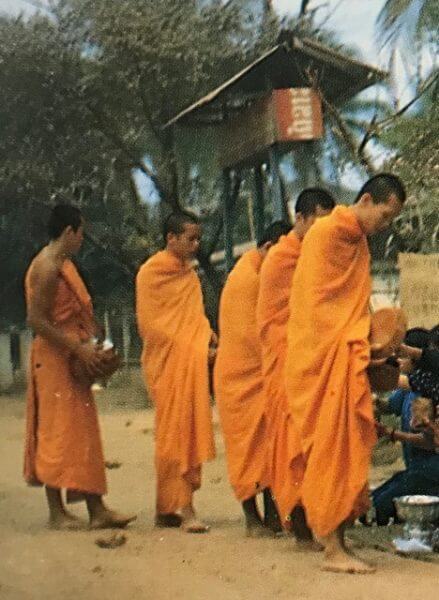 We then joined the funeral cortege en route to the temple, as is the custom for non-family. At the front of the cortege were monks, as well as those male family members who’d taken vows as monks for three days of prayer and meditation — all draped in saffron robes, one shoulder bare, heads shaven. Then came the rest of the family, male and female, dressed completely in white. Next, a truck with a replica of a small stupa in white paper trimmed with gold, the body inside, the whole draped with palm fronds, flowers and “trees” of bamboo with “leaves” of paper money. Behind the truck were friends of the family, some walking, some on bikes, some on motorbikes, some in cars. At the temple, the paper stupa was placed on a cement platform with logs of hardwood beneath and an elaborate cement canopy above. The flowers and money trees were placed around it, and a thick white cord was tied from the paper coffin to the roofed pavilion where the family sat on the floor with the monks who conducted the ceremony. We were told the white cord was to connect the living and the dead during these final prayers.
We then joined the funeral cortege en route to the temple, as is the custom for non-family. At the front of the cortege were monks, as well as those male family members who’d taken vows as monks for three days of prayer and meditation — all draped in saffron robes, one shoulder bare, heads shaven. Then came the rest of the family, male and female, dressed completely in white. Next, a truck with a replica of a small stupa in white paper trimmed with gold, the body inside, the whole draped with palm fronds, flowers and “trees” of bamboo with “leaves” of paper money. Behind the truck were friends of the family, some walking, some on bikes, some on motorbikes, some in cars. At the temple, the paper stupa was placed on a cement platform with logs of hardwood beneath and an elaborate cement canopy above. The flowers and money trees were placed around it, and a thick white cord was tied from the paper coffin to the roofed pavilion where the family sat on the floor with the monks who conducted the ceremony. We were told the white cord was to connect the living and the dead during these final prayers.
We were conducted to a separate pavilion with the Minister and other honored guests. Other attendees stood around outside the two pavilions. A professional videotape team was capturing every event from procession to final departure.
The prayers were relatively short, and then senior family members removed the white cord and poured water around the crematory to appease the god of the soil.
[Many Lao ceremonies mix animist and Buddhist traditions, as is most probably the case with this pouring of water on the earth.]
We placed our flowers with the paper stupa and extended culturally appropriate, very formal condolences to the family. Mr. Boun Omme reached out to take Russell by the arm with both hands, a most unusual display of public emotion.
When all had made their offerings, the senior male family members removed the money trees and gave them to the temple, placed the wreaths which had previously been sent to the house (ours among them) near the paper coffin and removed the photo of the deceased. They then poured gasoline over everything on the platform. Each male lit the fire from a different angle, Mr. Boun Omme starting, because he was the eldest.
We two gazed into the flames feeling deepest sympathy for Mr. Boun Omme and his family, remembering our own family’s losses not so long ago [Russell’s parents, who died within weeks of each other]. Suddenly, one of the male family members appeared with a tray of small bank notes wrapped around sweet rice cakes and threw them up into the air. All the children of the neighborhood, who had been hanging around, shrieked and scrambled for these tokens of good luck. Incongruous for us during the most solemn moment, but we were told this is the sign that the ceremony is over.
As we turned to leave, Mr. Boun Omme came and stood beside Russell, staring into the fire, and Russell reached out to comfort him.
November 19
Now the kitchen’s hot water heater has gone on the fritz. [Note the small white/orange box to the left of the window in the previous kitchen photo.] It was only a gallon-size heater and had to be filled by turning on a tap, but at least it delivered. Now it doesn’t. The result is that Mme. Long, Russell and/or I spend a lot of time on our knees by the bathtub washing dishes. Although we reported the problem over a week ago, we still haven’t got it fixed. Should we ask for a newer, bigger, automatic hot water heater?
November 27
We’ve been officially invited to extend our stay in Laos for another year. All the entities involved — UN Development Programme, World Bank, Lao Government, Lao and expatriate colleagues — think R’s doing a first-class job and should have another year in order to continue work in progress.
This past Sunday, the Prime Ministers of Laos and Thailand and the Trade and Development Minister of Australia (the funder) met on a barge in the middle of the Mekong to inaugurate the construction of the Friendship Bridge across the river. The bridge should be ready in 1994, and no one can predict all the changes that will result. Neither side of the river will ever be the same.
1992
January 28
Normally you have to stay in the field for two years before earning home leave. However, this was originally a one-year project, so the budget included round-trip tickets for us to and from Laos. When the project was extended, they created a budget for next year with two round-trip tickets. “Use it or lose it” — it would cost more to reprocess the first set of tickets through the various entities than to use them. Plus the sponsoring organizations think it’s worthwhile for Russell to have business meetings along the route, what with international air tickets allowing virtually unlimited stops for free.
[Our around-the-world trip, including meetings in Europe, the American mainland and Hawaii, as well as home leave on both coasts, lasted six weeks. A later post will recap our foreign travels while in Laos, including vacations and professional trips for the Foreign Investment Project.]
We’re inundated with damp. It hangs in the air, in your hair and in your clothes. It sticks all your envelopes together. It grows green mold on your shoes at the back of the closet. Paper becomes limp, tea goes stale, crackers lose zest, and the wrapper won’t come off the chewing gum. Not the best of times.
 Yet it’s a wonderful time. The garden flourishes, and we just shove cuttings in the ground, watching them take root and bloom. It’s far cooler: we sleep without air conditioning; only the ceiling fan whirls above. Skin plumps up, and wrinkles try to disappear. There’s the promise, drawing closer with each day, that the cool season is just over the horizon. You can feel it coming.
Yet it’s a wonderful time. The garden flourishes, and we just shove cuttings in the ground, watching them take root and bloom. It’s far cooler: we sleep without air conditioning; only the ceiling fan whirls above. Skin plumps up, and wrinkles try to disappear. There’s the promise, drawing closer with each day, that the cool season is just over the horizon. You can feel it coming.
July 1
One of our expat acquaintances has started making jackets and evening purses from silk fabrics and decorative items which she’s been collecting all over Asia for years. She’s exporting these one-of-a-kind jackets to exclusive boutiques in Australia and the States. I commissioned a reversible jacket — black Lao silk, trimmed with Cambodian silk in red/black/gold on one side and with an embroidered diamond-shape from Afghanistan on the other. I’ve also asked her to make two silk purses, one in black and one in cream.
July 9
Friend Monique, wife of the Australian Ambassador, mentioned they were looking for a new cook, and I thought of our cook’s younger sister, Khetmani, whose foreign family had just left. Mme. Long spoke to Khetmani, who said she felt too young and inexperienced to work at an embassy and suggested that Mme. Long take that job since she’d previously worked for the UNDP Res Rep with lots of official entertaining. End result: everybody wins. Monique and Michael get a good cook with experience in formal entertaining. Mme. Long gets prestige, better pay, long-term employment (as opposed to moving every two years), the use of the Australian Clinic for her family and only cooking duties. We get Khetmani, who has a lovely disposition and cooks well, as we learned when she helped Mme. Long prepare our parties.
Some expats are now getting TVs with satellite dishes. The big question is: Do you aim for Bangkok, Hong Kong or the French broadcasts? You must choose from which satellite you want your signal.
[We didn’t get a TV — not enough interest in what was available, plus we liked quiet evenings of reading in the midst of the social whirl, never missing the blaring screen.]
August 26
We finally got our home-furnishing allowance! Four months late. I promptly bought a new stove and a clothes washer. They’re not up to U.S. standards, but we can now get Whirlpool and Japanese brands of better quality than the Chinese and Soviet ones heretofore available. Our new stove has four (4!) burners and a good-size oven with a thermostat. I’m not sure I can bake a cake now that I don’t have to guess at the oven temp. The washer has almost twice the capacity of the old one plus an automatic spin cycle, so we don’t have to wring out clothes by hand.
I’m going to put air conditioning in the kitchen and add exhaust fans in our bedroom and the large bathroom (which has no exterior window). The kitchen has never had a.c. I guess previous tenants and the landlord never thought it was necessary, but I’ve seen how much our cooks have suffered, as well as felt it myself. We’ll have to figure out how to put glass in the windows, which are only screened now, while retaining the screening for the days when it’s cool.
September 1
After a good start, the monsoon has slowed down. The river is low; one can see the sandbars under the water where the boat races ought to be in October [to be chronicled in a future post]. The rains have failed in the North, and the bridge construction across the Mekong is experiencing difficulties. Pray for the rain, the rice and the river.
September 7
The malaria parasite is mutating so quickly, no one knows what’s effective here. The Australian medical authorities emphasize avoiding being bitten: wearing cover-up clothing, having screens and/or mosquito nets, using “Mos-Bar” a new, highly effective bug repellent. The malaria-host mosquito only bites at certain times of night. The more people use anti-malarial drugs, the faster the parasite mutates. The problem is worse up-country than in Vientiane, but we still try to be careful.
October 1
The word from Sydney, where R’s Lao team will conduct an Investment Forum, is that we’ve all been invited for a moonlight dinner cruise around the harbor. I’m taking a wardrobe largely devoted to Lao fabrics, both silk and cotton. The Lao silk project was started by an American woman who’s mar-keting to collectors, museums and couturiers in Europe, Japan and the States. I ordered an indigo shawl plus enough silk for a skirt and matching shawl in warm blue with a flame-stitch band. I’ll have the skirt made in Bangkok while there later this month.
October 27
After months of fruitless efforts to buy a car, I finally have my own wheels, a 19-who-knows-what-year VW beetle, reconditioned, repainted, re-engined and many more renovations. We decided to lease a car because we couldn’t find a good one at a decent price. Because of shortages, people are asking (and getting) $2800 for 30-year-old beetles still needing major overhauls.
December 15
The river has nearly reached its seasonal low, and Don Chan Island now stretches several hundred meters to the North. Soon the trucks will come and harvest all the sand that the river carried down during the rainy season. They’ll drive right out to the sandbars which only a few weeks ago were covered by 30 feet of water.
Lots of buzz around town over the French ambassador’s latest mis-step. The vast majority of French “development assistance” is aimed at restoring French hegemony in S.E. Asia through teaching French language and culture. (By contrast, the Swedes are building roads, the Australians are building a bridge across the Mekong, and even the Americans who haven’t much assistance to give are donating food and medical supplies.) So imbued is the French ambassador with this francophonie policy that, when the Women’s International Group (whose official language is English because of the diversity of its membership) wrote all the ambassadors a letter in English, he returned his, saying he would not reply unless it was in French. AND the man is fluent in English! So affronted was WIG (and so powerful), they decided they didn’t need the support of the French Embassy for that particular function and continued without it. Even the French-speakers thought he was wrong — by extension, should WIG write each embassy in its native language? At last night’s French Embassy event, the ambassador went out of his way to seek us out and speak English. Has he learned a lesson???
December 22
Socializing among Lao and expats isn’t easy. Lao feel ill-at-ease in foreigners’ houses. Until recently, they weren’t even permitted to go to such events. Then they were allowed to go but had to get government permission first and report afterwards who was there, what was said, etc. Now they can come sans permission or reports.
Most Lao don’t have much money (a high-ranking government official makes $30 per month), so their “entertainment budget” is usually reserved for weddings, funerals and other ceremonial occasions.
1993
January 13
We hosted a lunch for the short-term project team which arrived on Sunday and their Lao counterparts. It’s always a challenge to figure out what to serve at such events. The Lao don’t like many Western dishes (e.g., anything with cheese). Most foreigners want to try Lao dishes, but if you serve them the real thing (often flavored with fermented fish sauce), they usually leave most of it on their plates, thus insulting the Lao. There are a few local dishes which foreigners usually like, so we had those — principally gaiyo, a thin pancake wrapped around meat and vegetables, eaten cold and dipped in a sweet-hot sauce; chicken sautéed with black mushrooms. Both groups like rice, salad and fresh fruit, so we had those plus brownies. The Lao seem to really appreciate chocolate, and traveling foreigners always like special desserts.
March 4
A couple weeks ago, Russell developed a mild cough. Now it’s more serious, not responding to three different types of treatment. He’s had an x-ray here, but they’re not sure what they’re seeing. R’s been sent home for the remainder of the week and told to take it easy (he’s run down from overwork). He coughs a lot, reads books and rests instead of sitting at the computer for a couple hours and talking on the phone to the office.
Our Virginia neighbors sent a newspaper clipping about the Stafford County Supervisors having voted to build a reservoir in our valley. From the sketch in the paper, we can’t tell if our house will be under water or on the shore of a lake.
March 11
Russell still hasn’t returned to the office. The Australian nurse made a house-call, saying, “Sorry, it’s another week at home.” We’ve been unable to get a firm diagnosis, but they suspect whooping cough! There’ve been a number of cases in the Swedish community.
I had a bit of a cough a couple weeks ago. Penicillin helped, but now it’s back, so I think I’ll see the nurse again. It’s the time of year for this sort of thing — dust in the air plus agricultural burning. Lots of folks are down or staggering with respiratory infections, and all the asthmatics have very active cases.
March 18
We’re better, not well, but better. I’d say we’re both up near the 90th percentile, hoping for 100% in the near future. It’s been a long haul, and we’re tired of being sick. Russell returned to work on Monday, but he’s working too hard.
March 23
One of cook Khetmani’s sisters (not Mme. Long) was killed in a tragic accident. She was going home from work on a motor scooter, when a young man weaving in and out of traffic at high speed on a moto hit her and sent her flying. Her neck was broken, and she died instantly. He’s in a coma in the hospital and may not live.
Unfortunately, this is becoming increasingly common. 50 new motor scooters hit the streets everyday, and 50 new cars every week. Most drivers bribe their way out of taking the driving test for a license.
I’ve been writing this letter, as I often do, over 3-4 days. It’s now Tuesday night, and we’ve just learned that Russell will be med-evacked to Bangkok on Thursday. His situation hasn’t really improved; he’s been running a low-grade fever for some time. All the stress since he’s been back at work hasn’t helped either. He can have a variety of tests in Bangkok, and they’ll hopefully figure out what’s wrong and what to do. We have one day in which to tie up loose ends professionally and personally. Then we’ll both fly down to Bangkok, and he’ll check into the hospital on Friday. Maybe we’ll be back on Sunday, maybe not. I don’t think there’s too much to worry about at present. Because medical care here is so minimal, folks get med-evacked much sooner than they would from other places.
March 31
Three different Bangkok doctors (a GP, a pulmonary specialist and an ENT specialist) all examined RBS, thumped him, x-rayed him (chest and sinuses), listened to him breathe and took his blood. At the end of three days, the diagnosis was acute sinusitis with drainage causing all the rest of the symptoms. They’ve given him four different medications, and he seems to be on the slow mend. You can’t be sick for over six weeks and get well overnight, but this new regimen seems to be doing the trick.
The irony is that I began to feel sick on the way home and ended up spending the last three days in bed. I’ve got a doozy of a cold with all the attendant symptoms. The Australian nurse said what I’d expected — stay in bed, drink lots of liquids, take aspirin and antihistamines, tough it out.
April 7
We’re both a great deal better. R will have a checkup this Saturday in Bangkok.
Siam Commercial Bank is going to tear down one of Vientiane’s finest examples of French colonial architecture in order to put up a nondescript four-story commercial “tower.” This will be at the end of Lane Xang Avenue that has only historical buildings — the two oldest temples, the palace and a collection of old French colonial buildings around the main intersection. One of them has been renovated by an American investor, and a French investor had already requested the same site as the Bank in order to renovate the old building and establish a business. The other end of Lane Xang is already commercialized, and there are even vacant lots. Why not build the Bank tower there?
The Thai have already ruined their own capital and the medieval town of Chiang Mai in northern Thailand. Now they’re coming across the river to ruin Vientiane. Lots of Lao and foreigners are upset. The potential loss of this fine building is galvanizing both communities into action on two fronts: 1) In Bangkok, where foreign residents of Vientiane are writing letters to the editors of both English-language papers and to the president of the Siam Commercial Bank; and 2) In Vientiane, where Lao and foreigners are meeting in twos and threes to talk about what can be done to save this building and to develop a coordinated policy for the future.
It’s not that any of us is against progress and modernization. What’s important is a balance between modernization and preservation. The historical heart of the city has a unique architectural heritage. Once it’s gone, the Lao lose not only part of that heritage but also tourist revenue. Foreigners don’t come to see modern buildings but something exotic and different. Singapore learned this the hard way, rebuilding a replica of what once was, but tourists stay away from fake history. Kuala Lumpur has so far preserved the old while promoting the new, and it’s paid off in a more beautiful city for the residents and a more interesting city for visitor
* * *
We cherished the Lao cultural value of making all things beautiful — a plate of food, offerings at shrines, a small banana-leaf boat with candle and flowers to float on the Mekong. Seeing the potential for their architectural heritage to be destroyed was painful. We returned to Vientiane some years later to find the cityscape changed in many ways, some for the better, some not. But most of the old buildings were still there.

COMING NEXT MONTH
Laos, 1991-1993: Celebrating and Entertaining
Festivals, fish-pond feasts, formal Fourths and more

LET ME HEAR FROM YOU.
Please take a moment to share your thoughts.
Your comments help make the blog better, and I always answer.
* * *
If you enjoyed reading this post, I hope you’ll SUBSCRIBE by clicking on the button below. Every month, when I post a new excerpt from my life overseas, you’ll get an email with a link so you can read the next installment. Subscription is free, and I won’t share your contact information with anyone else. Your subscribing lets me know you’re reading what I write, and that means a lot.

